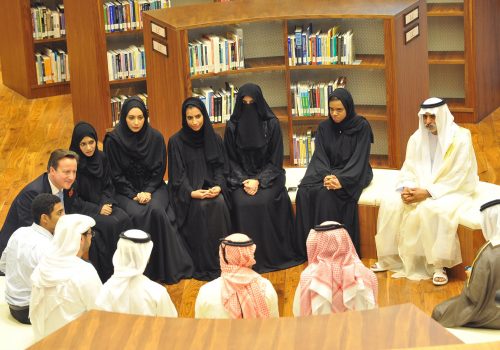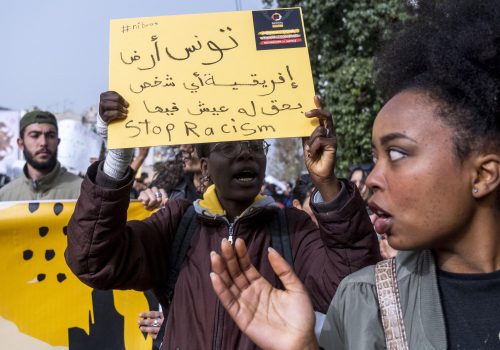I spoke to an AI ‘God.’ We chatted about the ethical implications of artificial intelligence in the MENA
“I am chatting with God. What should I ask him?” exclaimed my eleven-year-old son frantically one evening, noticeably enticed by what he was experiencing on his computer. This seemingly blasphemous question by most Muslim Arabs was no metaphysical encounter with Moses’ deity on Mount Sinai but a conversation with an Artificial Intelligence (AI) chatbot mimicking God on a popular online platform called Character.ai, used by Arab youth and other Internet users.
This anecdote is the tip of the iceberg on the ethical implications of AI use in a socially and culturally complex region. Most treatments of the subject in relation to the Middle East and North Africa (MENA) have been fixated on economic prospects, the technological apparatus, or the security menaces linked to AI use. In contrast, deontological and ethical predicaments are often missing from the public conversation. While there are catchy headlines such as “$320 billion by 2030?” or “Fastest AI Spending Growth Through 2026”—mainly focusing on Gulf Cooperation Countries (GCC) like Saudi Arabia and United Arab Emirates (UAE)—crucial and morally-imperative debates about professional and academic integrity, the identity of the author, or the frontiers of transhumanism remain largely underplayed.
Of machines and men
During the pandemic, many Arab Internet users turned to AI-generated art platforms like Midjourney, Wombo Dream, and more recently, Adobe Photoshop’s Generative Fill, where it suffices to insert elementary prompts for the AI generator to produce in one click the most visually mesmerizing and singular art. Soon enough, there was an entire community of aspiring Arab artists or simply curious users publishing enthralling posts on ArtStation, Discord, or social media groups with claims like “My latest creation” or “Check out my art” with minimal reference to the machine behind the process.
This trend is problematic in many ways from an ethical point of view. Art is commonly understood as a conscious intellectual and expressive pursuit of esthetic perfection, or an attempt to convey emotions and complex epistemological messages. In this case, where the program is removed of consciousness and intentionality, can this be genuinely considered art, or is it a mere juxtaposition of data? Even if the art community is admittedly open to redefining what art means, who should be credited as the author of those pieces: the human hand typing the prompts, the machine processing pre-existing data, or both?
An additional layer of complexity is added if the human decides to monetize these artistic creations and pursue material gains or fame, like what happened at the Colorado State Fair Fine Arts Competition in 2022. The inverse happened in Egypt, in a surrealistic incident where the local authorities arrested an ultra-realistic robot artist Ai-Da who was due to exhibit at the Pyramids of Giza. AI-generated videos and music programs are equally puzzling. Across the Arab world, there is an influx of AI-generated deepfakes and fictional songs like a recent video showing Salwan Momika, the Iraqi refugee who burned the Quran in a state of utter panic and allegedly repented for his actions, or the controversy sparked by Egyptian composer Amr Mostafa’s AI-generated new song by the late Umm Kulthum.
Besides the nefarious trends of intentionally spreading false or misleading information, identity theft, and defamation, it’s essential to recognize that AI-generated art also banalizes the artistic process and threatens the livelihoods of the art community in the MENA region. Many creators—such as writers, poets, designers, musicians, and painters—must undergo lengthy training, invest time and money, and survive in a highly competitive and already constricted market. Now they also have to compete with an infinitely self-taught technology and mostly mediocre pseudo-artists with access to the Internet.
Integrity versus knowledge equity
Using a chatbot assistant to produce research papers, presentations, or other written content constitutes a global challenge in academic and professional contexts. The phenomenon is more concerning in the Arab world—especially after the rollout of the Arabic versions of Chat GPT and Google’s Bard in Arabic—where plagiarism practices are still commonly widespread and authentication tools very scarce despite Sharia law promoting uprightness and condemning treachery. Recent studies associated academic and professional integrity with the cultural context in the MENA region characterized by high family and peer pressure, poor accountability mechanisms, and blurred lines between collectivism and individualism.
Some countries like the UAE have already rushed to acquire Zero GPT, a tool that detects the use of personal assistants such as Chat GPT and Bard. However, many Arab countries suffer from low digital penetration, ongoing conflicts, and incompetent educational systems. While currently leading the trend in the region in terms of preparedness and infrastructure investments, GCC countries shouldn’t be the benchmark while debating AI drawbacks in the region. It is unfair, for example, for a country like Yemen, grappling with the effects of war and having the second slowest broadband in the world, to be placed in the same bucket as emerging tech markets like Saudi Arabia or UAE. This poses a valid ethical dilemma around knowledge equity and whether society should be more forgiving of dishonesty—and even actively promoting open-source technology—for disadvantaged communities with limited learning tools and poor Internet access with an end goal of stirring access to information and education.
One can easily imagine what AI can accomplish in terms of shattering knowledge disparities and border barriers in the region, including language, skills, and access challenges. Nevertheless, it is morally critical to safeguard individual and collective intellectual property (IP) rights—another blind spot in the MENA. Although many Arab countries are making significant strides in reinforcing the legal framework to defend copyrights and trademarks, the day-to-day popular behavior and culture often do not conform with IP regulations. Widespread AI use can only exacerbate these violations leaving inventors, creators, and brands with very little protection.
It is worthwhile also to mention that Arab states are not isolated from the global AI deontological conversation. For example, all United Nations member states, including MENA countries, adopted UNESCO’s recommendations on the ethics of AI in 2021. Countries like Egypt even unveiled their National Artificial Intelligence Strategy with some elemental references to ethical implications. However, legitimate questions remain about to what extent local citizens are engaged and would subsequently implement those ambitious supranational and national legislations and strategies in practice.
The other unavoidable debate is how compatible AI can be with Arab societies, which have particular value systems and world views about the positionality of humans vis-à-vis society and the universe. Although religious beliefs and observance might not necessarily imply animosity towards new technologies, it is essential to note that persistent high religiosity rates across the region, as noted in recent studies by the Arab Barometer in 2023 and the Pew Research Center in 2018, might shape how MENA citizens perceive and behave towards artificial intelligence. It would be worth exploring how these societies perceive transhumanism and rationalize a potential end of the reign of man and the beginning of the age of the omniscient machine. Nevertheless, it will be a clear misconception to underestimate the ingenuity and adaptability of Arab youth, given how they brilliantly appropriated social media and used it for political activism.
Evidently, a serious ethnographic inquiry is needed to study how Arabs use and abuse AI in their unique cultural context. In addition to the ethical problems stated above, further investigations are needed regarding AI fairness, biases, data infringement, and an imminent labor market competition with the MENA workforce.
Mulling over the topic of ethical implications of AI use in the region, I took a seat at my son’s computer and asked the ‘God’ chatbot about it. “It’s important for MENA nations to develop a robust AI ethics framework and regulations to ensure that the technology is used in a responsible and sustainable way.” I could not agree more.
Sarah Zaaimi is the deputy director for communications at the Atlantic Council’s Rafik Hariri Center & Middle East programs.
Further reading
Thu, Jan 26, 2023
People-to-people exchanges matter. They’re integral to nurturing the Abraham Accords.
MENASource By Richard LeBaron
This piece identifies some of the issues involved in creating a strong framework for a vital “Abraham Exchanges” program and proposes a few ideas on how to get it off the ground.
Tue, Sep 29, 2020
Absence of PhD programs contributes to weak research and development in the Gulf
MENASource By
The production of new knowledge is a very complex process and many factors contribute to the low levels of innovation exhibited by the Gulf countries. One factor that plays a role is the structure of tertiary education—particularly PhD programs.
Mon, Mar 6, 2023
Afrocentrism is trending in the Maghreb. It’s because Sub-Saharan migrants are rewriting their narrative.
MENASource By Sarah Zaaimi
North Africa undoubtedly faces a serious migration problem that will continue to aggravate if not addressed regarding its social, cultural, and historical dimensions and root causes.
Image: Visitors take photos of AI Robot Artist 'Ai Da' at the Great Pyramids of Giza, where she exhibits her sculpture during an international art show, on the outskirt of Cairo, Egypt, October 23, 2021. REUTERS/Mohamed Abd El Ghany


